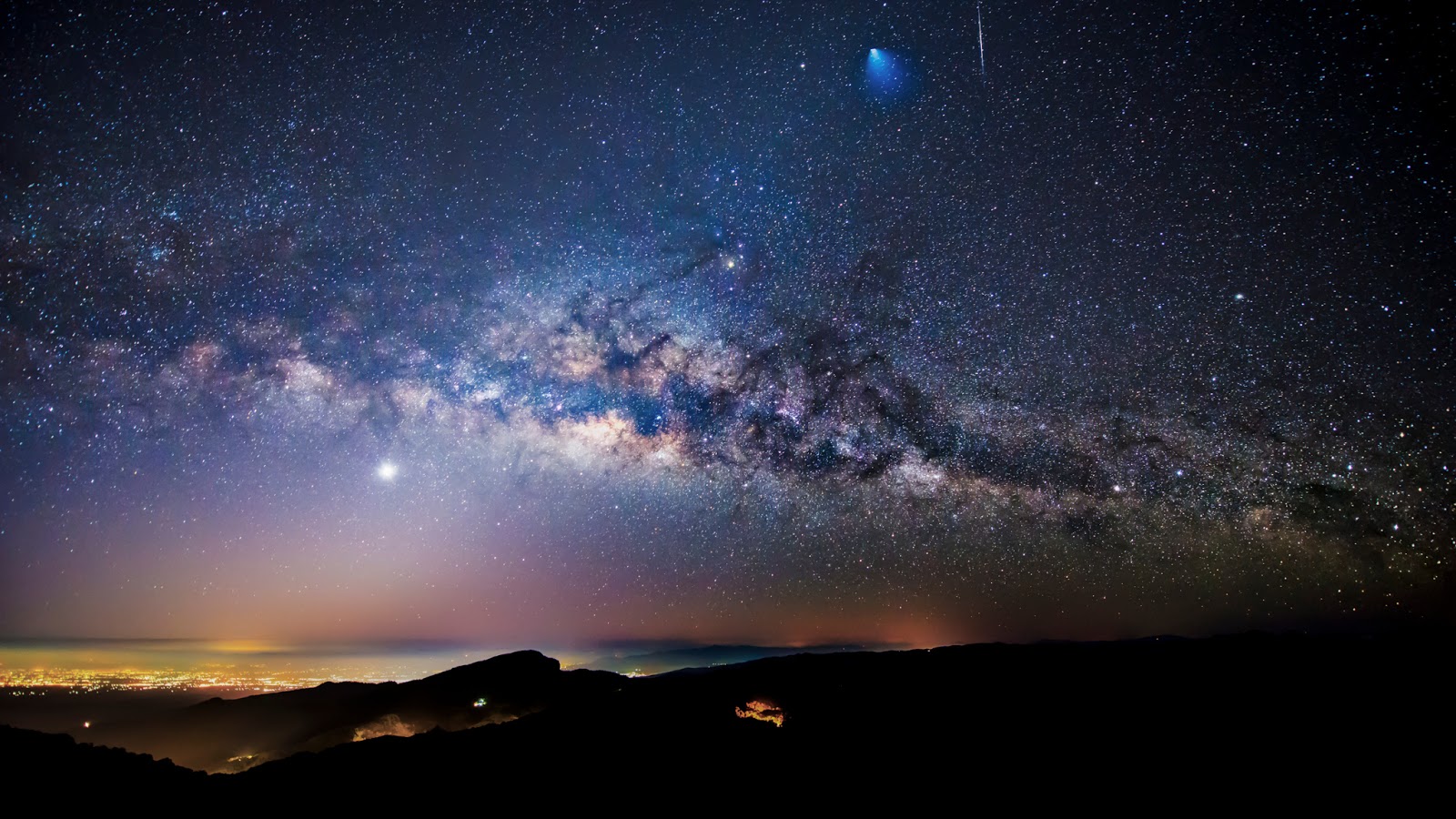The Universe and Life in a Nutshell
The Big Bang
The Big Bang, 13.7 billion years ago, did one thing. It introduced energy, more precisely gravity and electromagnetism, into existence. And as we know at the latest since Albert Einstein, energy equals matter. This is what E=mc² means. So out of this energy, protons and electrons started to form. It took the universe about 1 second to accomplish this. The next few hundreds of thousands of years it waited for these protons and electrons to combine in some useful way and indeed this is what happened. We call these combinations hydrogen and helium. So at this point, we have a universe full of hydrogen and helium atoms randomly arranged in a huge cloudy mush. Now it took the universe just another 200 million years to do something interesting again. Gravity compressed this mush here and there to a density and temperature so high, that the atoms started to fuse. And suddenly... suns everywhere. God switched on the light, so to say. Suns have a very long lifespan but ultimately they die in massive explosion called a supernova. These explosions are so hot that the protons and electrons are scrambled into all sorts of new combinations, resulting in many different new types of atoms. We actually managed to find all or at least most of them and put them into a table, the periodic table. So every now and then a sun explodes into a huge cloud of diverse matter. And again, gravity does what it does and compresses this matter, to planets for example. Some of which happen to surround another, younger sun, that did not explode yet, like in our case, luckily. Our solar system was formed about 4.5 billion years ago and it had another "star", metaphorically speaking, planet earth. It surrounds the sun at a distance at which temperatures are just perfect to support liquid water. And liquid water turned out to be the perfect stage for another story in the series "Just wait and something awesome will happen!".
Intelligent Life
Water acts as an environment for other atoms to form molecules, driven by the power of electromagnetism and randomness. And if we just wait long enough, molecules then form more complex structures like cells and suddenly... life everywhere! But still very simple life, vulnerable and unstable. We definitely must get rid of this randomness. And luckily life also introduced a way to get a little bit more organized. It invented a special molecule to store data and give it to the next generation, the very first USB stick, so to say, but with a much harder name which is Deoxyribonucleic acid or just DNA. The DNA acts as a blueprint for all kinds of living organisms but the coolest thing about it is that it can learn and evolve. Sometimes, very rarely, DNA mutates and so does the resulting organism and sometimes these mutations turn out to be not even that bad. These mutations are the driving force in biological evolution. Although this kind of learning and evolution is insanely slow, it eventually created really amazing organisms and ultimately a whole new and much more efficient way of learning. Brains. Brains are learning networks with a complexity of a whole galaxy. The human brain can build up way more neural connections than there are stars in the milky way. This in turn enabled us to develop ways of communication, language and writing, that we are able to sustain and share our ever growing knowledge over many generations throughout history. You could call this collective learning and maybe the interesting part of the story has just begun.
High-Speed Evolution
Connected through the internet, humans and machines alike, we are building a single global brain, fed with ridiculous amounts of data every day. And this brain, the brain of mankind, is learning at high speed, getting faster and faster. We abstracted away the biological part of learning and now we start to engineer learning into technology.
It took the universe billions of years to come up with intelligent life and just in the blink of an eye, this intelligence engineers an artificial version of itself that will very soon exceed its predecessor. And, as if this wouldn't be fascinating enough already, we are slowly taking control over natures blueprints. A method like CRISPR truly allows us to play god and manipulate DNA to an extend, where it is totally possible to revive any extinct species, influence existing ones, including our own, or maybe even create completely new ones. Also notable, the potential in the fight against all kinds of diseases, that were considered incurable so far. It seems evolution will not any longer only progress by random mutation and slow learning but by design.
An interesting future awaits us.
Inspiration for this text was the following video:
Basically I converted it to this text and gave it my own touch by using my own words.
(This also helps me to improve my english writing.)
Let me know if you liked it or if there are any issues in form or content.
Thank you for reading!

Very nice write up, done well! And nice picture of the Milky Way!
Thank you! :)
Well written! You explained a really interesting, difficult and complex subject in a manner that was easy to read. Maybe you should write school books :P some how most school books manage to make even the most interesting subjects seem boring... I think your english is really good! Except for one typo here: "much more efficient way of leaning. Brains." Guessing you meant learning :)
Thanks for your feedback! Makes me really happy! And I fixed the typo. :)